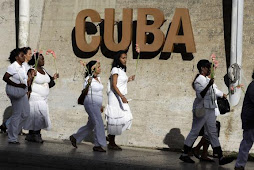Wait, Cuba has its own Internet?
By Nancy Scola December 19 at 3:06 PM
According to official Cuban government statistics, some 23 percent of
Cubans are on the Internet. But when the White House announced the
President Obama's new approach to Cuba, it railed against that country's
"Internet penetration of about five percent—one of the lowest rates in
the world."
So what's with that considerable gap, which represents whether about 2
million Cubans do or don't go online?
It's a matter of definition. The Cuban Internet is different from the
Internet that most of the rest of the world knows. And on the Cuban
version of the Internet, there is no Twitter, no YouTube, few blogs or
publications from the United States or elsewhere beyond the boundaries
of that island nation. Instead, explains Internet researcher Sanja Kelly
of the pro-democracy group Freedom House, that Cuba-wide web is limited
to a national e-mail system, some government-approved Web sites, a Cuban
encyclopedia, and little else.
Indeed, Cuba has its own Internet, thought the better term is probably
Intranet, like you might have at work. Only an entire country is on it,
and can't break past its borders.
Given the relative paucity of content on the Cuban Internet, explains
Kelly, "most people just use it for e-mail."
Of course, there are other countries around the world that limit what
their citizens can see online, including Russia and China. But Cuba,
says Kelly, doesn't rely upon the same sort of technological filtering
to restrict where online Cubans might go. Instead, she explains, the
Cuban approach is uniquely far more binary. "The government prefers to
limit access" -- to the full, global Internet, that is -- "through a
total lack of connectivity and artificially high prices."
Who are the 5 percent of Cubans who can go where they'd like online?
Doctors, government lawyers, party officials, and a handful of other
"non-threatening" Cubans, reports Kelly. There are laws in place in Cuba
that make it illegal for online service providers to allow access to the
global Internet to those without a government-issued license.
Cuban officials have, in recent years, made public pronouncements about
the need for Cuba to enter the digital age. Beginning in 2009, the
Castro government began opening would become about a hundred Internet
cafés around the country. But even there, subtle and not so subtle
discouragements exist. Visiting international sites costs about seven
times what it costs to get on the national Intranet, or about $4.50 an
hour. Given that the average monthly salary in Cuba is about $20, those
price differences can be an effective nudge towards sticking in the
Cuban digital cul-de-sac.
And if that doesn't do it, explains Kelly, there are alerts that pop up
telling users that their visits to non-Cuban Web sites are being monitored.
Some resourceful Cubans have found ways around the restrictions.
"A family member from abroad will bring a WiFi set-up and patch into
someone else's 3G connection," explains Julia Sweig, director of Latin
America studies at the Council on Foreign Relations. Younger Cubans in
particular will hang around outside hotels -- where, inside, wealthy
Cubans and foreigners can go online -- and hop on wireless connections
using borrowed passwords. And, says Sweig, some Cubans have figured out
how to have some benefits of the modern Internet though what some in the
field call "sneakernets": they'll go online and download movies, music,
and other materials and pass them around among friends and family on USB
drives.
Will Obama's negotiations with the Cuban government, which includes the
promised loosening of restrictions on the import and sale of laptops and
other telecommunications equipment, actually make it easier for more
Cubans to roam far more freely online? At least one high-profile critic
of Obama's Cuba policy doubts it.
Sen. Marco Rubio (R-Fla.) slammed the Obama administration this week for
failing to get any meaningful concessions that might bring more Cubans
truly online.
"The president said that the people of Cuba do not have access to
advanced, 21st century, modern technology for communications and
telecommunications because of the U.S. embargo. That is false," Rubio
said. "The reason why they don't have access to telecommunications, like
smartphones, like access to the Internet, is because it's illegal in Cuba."
"This notion that Cuba is going to allow the Cuban people access to any
Web site they want," said Rubio, "is ridiculous."
Nancy Scola is a reporter who covers the intersections of technology and
public policy, politics, and governance.
Source: Wait, Cuba has its own Internet? - The Washington Post -
http://www.washingtonpost.com/blogs/the-switch/wp/2014/12/19/wait-cuba-has-its-own-internet/
Subscribe to:
Post Comments (Atom)





No comments:
Post a Comment